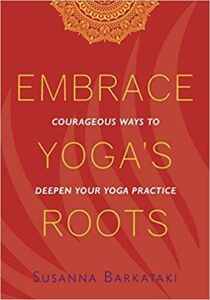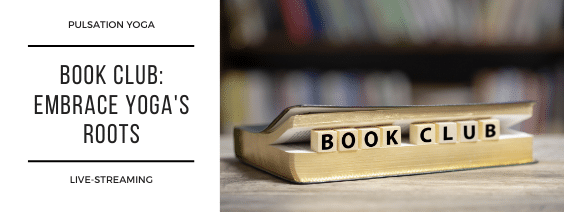As a yoga teacher, studio co-owner, and practitioner, I feel an enormous amount of responsibility to disseminate information about yoga history, philosophy and practices as its native land intended. When I began my yoga journey I heard terms like Namaste, shanti, satya and samadhi regularly. It took me years to truly appreciate the language of yoga, (Sanskrit), and to be able to implement it into my daily life.
Finding the Yogic Path
 I began yoga, like many do in the USA, thinking it is simply a form of exercise or a way to relax. Neither reason is wrong or untrue and for whatever reason you step on to the mat is your truth, satya. However, the system of yoga is meant to be practiced on and off the mat. Over time, as I practiced and learned about yoga, I began to slowly pick apart who I thought I was, only to discover a very different person beneath. I embraced this journey with an open heart, refusing to give up when I followed the slippery slope of negative thinking.
I began yoga, like many do in the USA, thinking it is simply a form of exercise or a way to relax. Neither reason is wrong or untrue and for whatever reason you step on to the mat is your truth, satya. However, the system of yoga is meant to be practiced on and off the mat. Over time, as I practiced and learned about yoga, I began to slowly pick apart who I thought I was, only to discover a very different person beneath. I embraced this journey with an open heart, refusing to give up when I followed the slippery slope of negative thinking.
Eight years later I found myself on an unexpected path that I am eternally grateful for. I used to joke that I couldn’t get enough yoga in my life. Now, yoga is my everyday and has become the way I try to live life. Due to my position in the studio and my dedication to the practice, I recently started to ask myself if I truly uphold yoga as is intended by the South East Asians who created this system. If I truly consider myself a yogini then I must ask these hard questions. I must examine all possibilities, set my ego aside and let go of the desire to be right if this is the the truth that I seek.
This is truly the yogic path: sifting through reality as we know it, meditating on the infinite possibilities of our own purpose in this world, which connects ourselves to our Self, connects us to each other, and connects us to the Universe. This process will reframe our way of thinking towards peace of mind, body and soul into a unified whole. From here we find bliss, or samadhi.
Honoring and Respecting Our Roots
How do we achieve such a lofty goal you might ask? By living life guided by its principles, and with respect for the many teachers who passed it down and spread the joy of yoga throughout the world.
 My deep respect and reverence for the practice and my teachers’ teachers, as well as honoring the system as its native land intended, led me on a new path of exploration this past year. As the country was dealing with a pandemic, division, and hate, with no end in sight, I went in search of answers and understanding about how my home reached these conditions. I also asked myself, “How can I help? How can I do better and be better?” Often when I need guidance or help I turn to my greatest resources and friends: books. Around this same time I also received an email about an upcoming workshop based on a book entitled, Embracing Yogas Roots: Courageous Ways to Deepen Your Yoga Practice, by Susanna Barkataki. It’s always amazing when life guides you to what you seek!
My deep respect and reverence for the practice and my teachers’ teachers, as well as honoring the system as its native land intended, led me on a new path of exploration this past year. As the country was dealing with a pandemic, division, and hate, with no end in sight, I went in search of answers and understanding about how my home reached these conditions. I also asked myself, “How can I help? How can I do better and be better?” Often when I need guidance or help I turn to my greatest resources and friends: books. Around this same time I also received an email about an upcoming workshop based on a book entitled, Embracing Yogas Roots: Courageous Ways to Deepen Your Yoga Practice, by Susanna Barkataki. It’s always amazing when life guides you to what you seek!
Embracing Yogas Roots began my journey of self reflection to help make me aware of my connection to yoga culture in the West. Yoga is practiced by millions within the United States in gyms, studios, parks and houses, and even amongst goats. Basically, it’s everywhere. However, while the practice may be everywhere, it is not available to everyone. Price of entry and lack of opportunity hinders many from experiencing the benefits of yoga. If yoga’s intention is unity, then are we successfully practicing yoga today if so many are left out? How can modern yogis work together to make a yoga space more inclusive and authentic? How can we engage in this social conversation effectively enough to implement change? We can begin by learning from the indigenous practitioners and honor the ways in which they ask us to help facilitate this change.
Living and Leading Authentically
Susanna Barkataki teaches modern practitioners how to live and lead an authentic yogic life without culturally appropriating amidst the modern Westernized interpretations of yoga. Her book examines the effects of colonizing yoga, the white supremacy of yoga, and the watering down of many foundational principles to make the practice more accessible and relatable to modern, western practitioners. She offers questions and asks readers to examine the hard truths. She advocates for People of Color and the members of LGTBQ+ community to be welcomed and represented in yoga spaces. And she offers ways to teach and practice yoga without culturally appropriating it. Barkataki is striving to decolonize yoga by “returning the knowledge to the source from which it came from” (Barkataki, 40). On this note, she says, “Part of the work of reclaiming the roots of yoga is living and practicing yoga as a way of being, a philosophy and way of life. We invite this in by asking: do my choices lead to more separation or more unity?” (Barkataki, 60)
Continuing and Sharing the Conversation
At Pulsation Yoga, Susan, Sandy and I are blessed with a wonderful community and a family of teachers. I’d like to share in this conversation with you all. Hear your thoughts. Answer your questions or ask my own. I want you to help me better understand new perspectives.
It is with great excitement that we introduce a bi-monthly book discussion. The first will take place Sunday, June 13, 2021, at 12:00 cst, live-streaming (feel free to enjoy this conversation over lunch). I will host the discussion for our first book, Embracing Yogas Roots. The discussion will be free, with the option to give a $10 donation or greater to South Asian Americans Leading Together (SAALT). The goal of the discussion will be to create a safe space where attendees can speak from the heart, listen deeply, open their minds to new thinking, learn, and become more connected to yoga, the studio, and one another.
I truly hope that for many of you that yoga has provided you with self reflection, growth and peace. If at the end of the day it gives you the time to yourself you need, beautiful. And my job is to help you attain your own enlightenment. Lastly, my personal hope is that some of you will have these difficult conversations with me and each other to help reshape our community’s ways of thinking to impact our society’s ways of thinking because I can’t do this without you and we can’t do this without each other.
I wish you all peace, peace, real peace. Om shanti, shanti, shanti.

